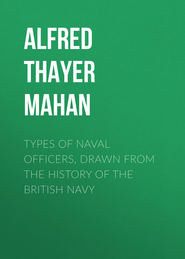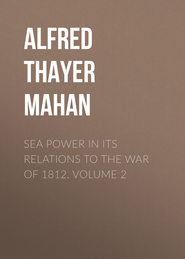По всем вопросам обращайтесь на: info@litportal.ru
(©) 2003-2024.
✖
Admiral Farragut
Настройки чтения
Размер шрифта
Высота строк
Поля
Szymanski, Confederate colonel, opinion as to effect of Farragut's passage of the Mississippi forts, 146 (#x4_x_4_i42).
Tecumseh, U. S. monitor, sunk at Mobile, 256 (#x7_x_7_i45), 268 (#x7_x_7_i64), 271 (#x7_x_7_i68), 273 (#x7_x_7_i69), 274 (#x7_x_7_i71), 275 (#x7_x_7_i72).
Tennessee, Confederate iron-clad, description of, 248 (#x7_x_7_i36), 256-258 (#x7_x_7_i45);
part taken by, in battle of Mobile Bay, 265 (#x7_x_7_i55), 273 (#x7_x_7_i69), 274 (#x7_x_7_i71), 275 (#x7_x_7_i72), 279-288 (#x7_x_7_i76).
Texas, importance of, to Confederacy, 207 (#x5_x_5_i47), 209 (#x5_x_5_i49), 237 (#x6_x_6_i33).
Varuna, U. S. steamer, sunk at passage of Mississippi forts, 163 (#x4_x_4_i68).
Vera Cruz, French attack on, 75-83 (#x2_x_2_i37);
Farragut's report on, 83-88 (#x2_x_2_i45).
Vicksburg, Farragut's first advance against, 181 (#x5_x_5_i13), 182 (#x5_x_5_i14);
his reluctance to a second advance, 182-184 (#x5_x_5_i14);
second advance, 186 (#x5_x_5_i17);
situation of, 186 (#x5_x_5_i17);
Farragut passes batteries, 187 (#x5_x_5_i20);
return below, 192 (#x5_x_5_i29);
importance of Vicksburg to Confederacy, 180 (#x5_x_5_i12), 187 (#x5_x_5_i20), 194 (#x5_x_5_i31), 195 (#x5_x_5_i32), 233 (#x6_x_6_i29);
Farragut's third advance to, 226 (#x6_x_6_i18);
surrender of, 235 (#x6_x_6_i31).
Warley, A. F., Lieut., Confederate navy, commands Manassas at battle of New Orleans, 157 (#x4_x_4_i62), 158 (#x4_x_4_i63).
Watson, Lieut. John C., (now captain), U. S. N., Farragut's flag-lieutenant, 1862-'65, 161 (#x4_x_4_i66), 260 (#x7_x_7_i49), 272 (#x7_x_7_i69).
Welles, Gideon, Secretary of the Navy, 1861-'69, 117 (#x3_x_3_i46);
connection with New Orleans expedition, 119 (#x3_x_3_i48), 120 (#x3_x_3_i49), 121 (#x3_x_3_i49), 125 (#x3_x_3_i53), 126 (#x3_x_3_i54);
impressions of Farragut, 124 (#x3_x_3_i53);
urges Farragut up the Mississippi, 177 (#x5_x_5_i5), 181 (#x5_x_5_i13);
letter of, 222 (#x6_x_6_i14) (note).
Wolseley, Lord, views as to the cause of reduction of Mississippi forts criticised, 142-147 (#x4_x_4_i39).
THE END
notes
1
Marshall's Naval Biography, article Hillyar, vol. iv, p. 861.
2
The writer remembers to have heard in his early days in the service a tradition of a ship commanded by Creighton, which he believes to have been the Washington, and which illustrates the methods by which this extreme smartness was obtained. In each boat at the booms was constantly a midshipman in full dress, cocked hat included, so that no time might be lost in dropping alongside when called away. The full crew was probably also kept in her.
3
Washington's Letters, October 1, 1781.
4
Montgomery Blair, in The United Service, January, 1881.
5
Gideon Welles, in the Galaxy, November, 1871.
6
Gideon Welles, in the Galaxy, December, 1871.
7
There were some guns bearing inland and some flanking howitzers, besides those already enumerated.
8
Official Records of the War of the Rebellion, Series I, vol. vi, p. 610.
9
The following is Grant's account of a matter which, but for Sherman's own zeal in proclaiming the merits of his commander-in-chief, would probably have always remained unknown. It would be difficult to find a closer parallel to the difference of judgment existing between Farragut and Porter at New Orleans: "When General Sherman first learned of the move I proposed to make, he called to see me about it. I was seated on the piazza, engaged in conversation with my staff, when he came up. After a few moments' conversation, he said he would like to see me alone. We passed into the house together and shut the door after us. Sherman then expressed his alarm at the move I had ordered, saying that I was putting myself voluntarily in a position which an enemy would be glad to manœuvre a year—or a long time—to get me in. I was going into the enemy's country, with a large river behind me, and the enemy holding points strongly fortified above and below. He said that it was an axiom in war that when any great body of troops moved against an enemy they should do so from a base of supplies which they would guard as the apple of the eye, etc. He pointed out all the difficulties that might be encountered in the campaign proposed, and stated in turn what would be the true campaign to make. This was, in substance, to go back until high ground could be reached on the east bank of the river, fortify there and establish a depot of supplies, and move from there, being always prepared to fall back upon it in case of disaster. I said this would take us back to Memphis. Sherman then said that was the very place he should go to, and would move by railroad from Memphis to Granada. To this I replied, the country is already disheartened over the lack of success on the part of our armies,… and if we went back so far as Memphis, it would discourage the people so much that bases of supplies would be of no use; neither men to hold them nor supplies to put in them would be furnished. The problem was to move forward to a decisive victory, or our cause was lost.... Sherman wrote to my adjutant-general embodying his views of the campaign that should be made, and asking him to advise me at least to get the views of my generals upon the subject. Rawlins showed me the letter, but I did not see any reasons for changing my plans."—Personal Memoirs of U. S. Grant, vol. i, p. 542 (note).
10
The paper being long, only those parts are quoted which convey the objections to running by.
11
Lord Wolseley in North American Review, vol. cxlix, pp. 32-34, 597. The italics are the author's.
12
Tecumseh, U. S. monitor, sunk at Mobile, 256 (#x7_x_7_i45), 268 (#x7_x_7_i64), 271 (#x7_x_7_i68), 273 (#x7_x_7_i69), 274 (#x7_x_7_i71), 275 (#x7_x_7_i72).
Tennessee, Confederate iron-clad, description of, 248 (#x7_x_7_i36), 256-258 (#x7_x_7_i45);
part taken by, in battle of Mobile Bay, 265 (#x7_x_7_i55), 273 (#x7_x_7_i69), 274 (#x7_x_7_i71), 275 (#x7_x_7_i72), 279-288 (#x7_x_7_i76).
Texas, importance of, to Confederacy, 207 (#x5_x_5_i47), 209 (#x5_x_5_i49), 237 (#x6_x_6_i33).
Varuna, U. S. steamer, sunk at passage of Mississippi forts, 163 (#x4_x_4_i68).
Vera Cruz, French attack on, 75-83 (#x2_x_2_i37);
Farragut's report on, 83-88 (#x2_x_2_i45).
Vicksburg, Farragut's first advance against, 181 (#x5_x_5_i13), 182 (#x5_x_5_i14);
his reluctance to a second advance, 182-184 (#x5_x_5_i14);
second advance, 186 (#x5_x_5_i17);
situation of, 186 (#x5_x_5_i17);
Farragut passes batteries, 187 (#x5_x_5_i20);
return below, 192 (#x5_x_5_i29);
importance of Vicksburg to Confederacy, 180 (#x5_x_5_i12), 187 (#x5_x_5_i20), 194 (#x5_x_5_i31), 195 (#x5_x_5_i32), 233 (#x6_x_6_i29);
Farragut's third advance to, 226 (#x6_x_6_i18);
surrender of, 235 (#x6_x_6_i31).
Warley, A. F., Lieut., Confederate navy, commands Manassas at battle of New Orleans, 157 (#x4_x_4_i62), 158 (#x4_x_4_i63).
Watson, Lieut. John C., (now captain), U. S. N., Farragut's flag-lieutenant, 1862-'65, 161 (#x4_x_4_i66), 260 (#x7_x_7_i49), 272 (#x7_x_7_i69).
Welles, Gideon, Secretary of the Navy, 1861-'69, 117 (#x3_x_3_i46);
connection with New Orleans expedition, 119 (#x3_x_3_i48), 120 (#x3_x_3_i49), 121 (#x3_x_3_i49), 125 (#x3_x_3_i53), 126 (#x3_x_3_i54);
impressions of Farragut, 124 (#x3_x_3_i53);
urges Farragut up the Mississippi, 177 (#x5_x_5_i5), 181 (#x5_x_5_i13);
letter of, 222 (#x6_x_6_i14) (note).
Wolseley, Lord, views as to the cause of reduction of Mississippi forts criticised, 142-147 (#x4_x_4_i39).
THE END
notes
1
Marshall's Naval Biography, article Hillyar, vol. iv, p. 861.
2
The writer remembers to have heard in his early days in the service a tradition of a ship commanded by Creighton, which he believes to have been the Washington, and which illustrates the methods by which this extreme smartness was obtained. In each boat at the booms was constantly a midshipman in full dress, cocked hat included, so that no time might be lost in dropping alongside when called away. The full crew was probably also kept in her.
3
Washington's Letters, October 1, 1781.
4
Montgomery Blair, in The United Service, January, 1881.
5
Gideon Welles, in the Galaxy, November, 1871.
6
Gideon Welles, in the Galaxy, December, 1871.
7
There were some guns bearing inland and some flanking howitzers, besides those already enumerated.
8
Official Records of the War of the Rebellion, Series I, vol. vi, p. 610.
9
The following is Grant's account of a matter which, but for Sherman's own zeal in proclaiming the merits of his commander-in-chief, would probably have always remained unknown. It would be difficult to find a closer parallel to the difference of judgment existing between Farragut and Porter at New Orleans: "When General Sherman first learned of the move I proposed to make, he called to see me about it. I was seated on the piazza, engaged in conversation with my staff, when he came up. After a few moments' conversation, he said he would like to see me alone. We passed into the house together and shut the door after us. Sherman then expressed his alarm at the move I had ordered, saying that I was putting myself voluntarily in a position which an enemy would be glad to manœuvre a year—or a long time—to get me in. I was going into the enemy's country, with a large river behind me, and the enemy holding points strongly fortified above and below. He said that it was an axiom in war that when any great body of troops moved against an enemy they should do so from a base of supplies which they would guard as the apple of the eye, etc. He pointed out all the difficulties that might be encountered in the campaign proposed, and stated in turn what would be the true campaign to make. This was, in substance, to go back until high ground could be reached on the east bank of the river, fortify there and establish a depot of supplies, and move from there, being always prepared to fall back upon it in case of disaster. I said this would take us back to Memphis. Sherman then said that was the very place he should go to, and would move by railroad from Memphis to Granada. To this I replied, the country is already disheartened over the lack of success on the part of our armies,… and if we went back so far as Memphis, it would discourage the people so much that bases of supplies would be of no use; neither men to hold them nor supplies to put in them would be furnished. The problem was to move forward to a decisive victory, or our cause was lost.... Sherman wrote to my adjutant-general embodying his views of the campaign that should be made, and asking him to advise me at least to get the views of my generals upon the subject. Rawlins showed me the letter, but I did not see any reasons for changing my plans."—Personal Memoirs of U. S. Grant, vol. i, p. 542 (note).
10
The paper being long, only those parts are quoted which convey the objections to running by.
11
Lord Wolseley in North American Review, vol. cxlix, pp. 32-34, 597. The italics are the author's.
12











